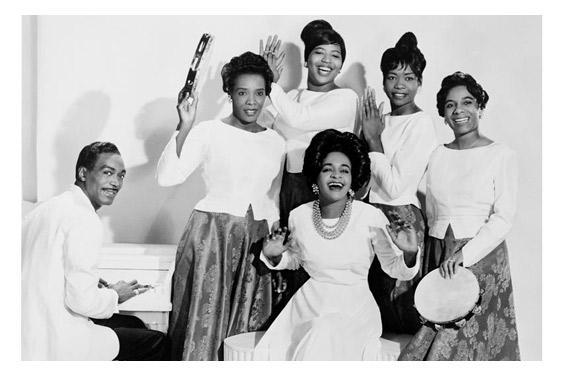“His eye is on the sparrow/ and I know He watches me,” sings R. H. Harris, the lead of the great gospel quartet Soul Stirrers. On the word “eye” he stretches the syllable out into a rippling caress, and then turns “He” and “me” into falsetto sparrowlike trilling yodels, rising above the other singers who trundle along faithfully below. Those two lovely “eee”s, one for “He” and one for “me,” lean against each other, and in that sublime rhyme the singer is both watched and watching, cared for and caring—God seeing the sparrow and the sparrow seeing us, until looking, singing, and loving become a single reciprocal benediction.
Anthony Heilbut included R.H. Harris’ version of “His Eye Is on the Sparrow” on a crucial 2005 compilation, When Gospel Was Gospel, which drew on Heilbut’s lifetime investment in the music. In his elegant collection of essays, The Fan Who Knew Too Much, Heilbut, the child of German Jewish immigrants, recalls attending R&B shows at the Apollo theater in the ’50s when an usher recommended he check out the gospel shows as well. Heilbut did, and like Paul at Damascus was converted and “became obsessed with proselytizing”—not for God, but for God’s singers. In the course of the next five decades, Heilbut wrote a pioneering history of gospel (1971’s The Gospel Sound: Good News and Bad Times), put together innumerable anthologies, wrote even more innumerable liner notes, and produced recordings by many of the greatest singers in the genre, including Mahalia Jackson, Alex Bradford, and Dorothy Love Coates.*
Heilbut’s life has been organized around fandom, and his essays chronicle his obsessions from gospel to male sopranos to émigré literature to soap operas. He was a child of the Internet before there was an Internet. Parts of this book are charged with the joy of a man who has waited all his life for the gates to open, and has finally been ushered into YouTube—where he can weigh the soaring high notes of rocker Mitch Ryder against those of gospel star Carl Hall for all eternity.
As Heilbut himself admits, it’s easy to poke fun at the insular lives of fans, who “know everything about one special thing, and nothing about anything else.” And certainly, fandom can be a cramped and bitterly sectarian endeavor, with each subculture huddled in its sad and lonely hovel, emerging only to spray its territory and/or to chastise apostates. Disputes over politics and religion are all well and good, Heilbut says, but if you really want to see acolytes enraged, publicly denigrate Bob Dylan’s music. Hell hath no fury like a classic rock aficionado scorned.
If fandom can balkanize, though, The Fan Who Knew Too Much suggests it can also catholicize, drawing people into the big tent rather than drawing boundaries around it. For Heilbut, specialized, nerdy knowledge has not represented a retreat into a room of one’s own. Instead, it’s a way to open doors.
This metaphor is most obviously relevant in the book’s first essay, “The Children in Their Secret Closet,” in which Heilbut gives gospel music back its gayness. “It is impossible,” he writes, “to understand the story of black America without foregrounding the experiences of the gay men of gospel,” and then, deploying a matchless knowledge of the music, its practitioners, and its cultural context, he proves it.
It’s not just that so many of the men and women in gospel—from Alex Bradford to James Cleveland to Ruth Davis to Robert Anderson to innumerable less well-known singers, directors, and fans—were gay. Nor is it simply that some of the most important figures of the civil rights movement, like James Baldwin and Bayard Rustin, came out of the church’s gay tradition. Rather, Heilbut makes the case that gospel has always been essentially and characteristically gay at its heart. Songs of overcoming are not just about overcoming race prejudice; they’re about the experiences of the boys and girls who were beaten and bullied for being queer. And gospel’s greatest musical resource—the cross-gender impersonation that led men like Bradford to imitate the soaring notes of divas, while women like Marion Williams reached the deep bottom of men’s voices—was born from a gay sensibility, which disconnects performance from gender. In this context, Heilbut argues, the virulent homophobia that has swept through the black church in the past decades is a betrayal not just of gay men and women, but of the black church’s own heart.
For Heilbut, then, to be a fan is to know where, and what, the heart is. And throughout the book, across art forms, he argues that the heart is with those who have been turned out; that the center of a community and an art are in fact not at the center, but at the margin. So Aretha got over not because she left gospel behind, but because she kept faith with all of those—Clara Ward, Mahalia, her own father—who came before her. So the German émigré Jews, like Heilbut himself, are the truest expression of America, just as, Heilbut argues, Jewish culture was the heart and soul of German culture. The soap opera, that benighted, disdained pastime for working-class women, becomes, through Heilbut’s obsessive chronicling, a quintessential American expression. Josh White, the much sneered-at inauthentic token bluesman of the folk revival, displaces Robert Johnson in Heilbut’s pantheon of authenticity, craft, and soul. And everywhere, in everything, from gospel to soap opera to émigré literature, the gay experience emerges as inseparable from every form of art and of life.
As he reiterates many times, Heilbut is an atheist. His attraction to gospel was not because of its Christian message. Instead, he was attracted to the formal power of the music, and the way it spoke about trouble and persecution.

Photo by Stephen Ladner.
Gospel won me emotionally. What I fixed upon was not in any way religious. … There was another reason for my identification with the singers. I had been an isolated child, for years the class bookworm, nerd, outcast. Like so many others, I found school a torment, the arena in which my enemies could exploit my various weaknesses. They were gifted bullies. …
For the gospel that reached me, the passion of “How I Got Over,” wasn’t merely about making it, but about doing so in spite of your enemies. Gospel grounded me and kept me sane, not because “it gets better,” but because for most people, it does not.
What is Christianity about if it isn’t about the outcast and the abused—about love and comfort, especially for those on the cross? Heilbut may reject the gospel, but in his insight that gospel is about all those who are rejected, he couldn’t embrace it more closely.
The devotional nature of Heilbut’s writing comes through most clearly, perhaps, when he chronicles the great passion of his life: the music, the voice, and the soul of gospel performer Marion Williams. Williams was one of the greatest singers who ever lived, and one of the most influential—her soaring “Oooooo!” was taken over by Little Richard, who passed on the style to everyone from the Beatles to Otis Redding. Despite her importance, Williams was largely unknown outside gospel circles until Heilbut took up her cause; the recordings he made with her, and his tireless advocacy, helped her win a MacArthur grant before she died.
As any fan would be, Heilbut is proud of having identified Williams’ greatness when others didn’t see, and even more proud of having worked with her and brought her at least a share of glory. Moments from their friendship peep through throughout the book. After one spectacular take in the studio, Heilbut was thrilled to have captured the “performance of a lifetime”—until he learned that the engineer had forgotten to run the tape. To Heilbut, the point of the story is the somewhat ridiculous tragedy of a fan’s should-have-beens. But to me what makes the anecdote so touching is the glimpse of Marion’s easy affection for him. “That’s all right, baby,” she said. “Let me rub your hands, and then I’ll sing it again.”
As this suggests, Williams and Heilbut shared an easy intimacy; Williams even referred to Heilbut’s mom as “my Jewish mother.” Knowing everything about one thing did not isolate Heilbut; on the contrary, it gave him a sister. Through fandom, he built a life, a family, and a community not around consanguinity, but around the heart. That is surely in the best traditions of the gay community that Heilbut speaks for so eloquently, and of the church to which Heilbut has also, in his way, born witness. Despite its title, Heilbut’s generous book demonstrates that no fan can know too much, or love too much, as long as the knowing and loving are in the interest of helping all God’s children—and all God’s sparrows as well—to get over.
—
The Fan Who Knew Too Much: Aretha Franklin, the Rise of the Soap Opera, Children of the Gospel Church, and Other Meditations by Anthony Heilbut. Knopf.
See all the pieces in this month’s Slate Book Review.
Sign up for the Slate Book Review monthly newsletter.
Correction, July 2, 2012: A caption on the photograph accompanying this article originally dated the photo to 1912.
Correction, July 6, 2012: This review misstated the title of Anthony Heilbut’s 1971 book on gospel. It is called The Gospel Sound: Good News and Bad Times. (Return.)
